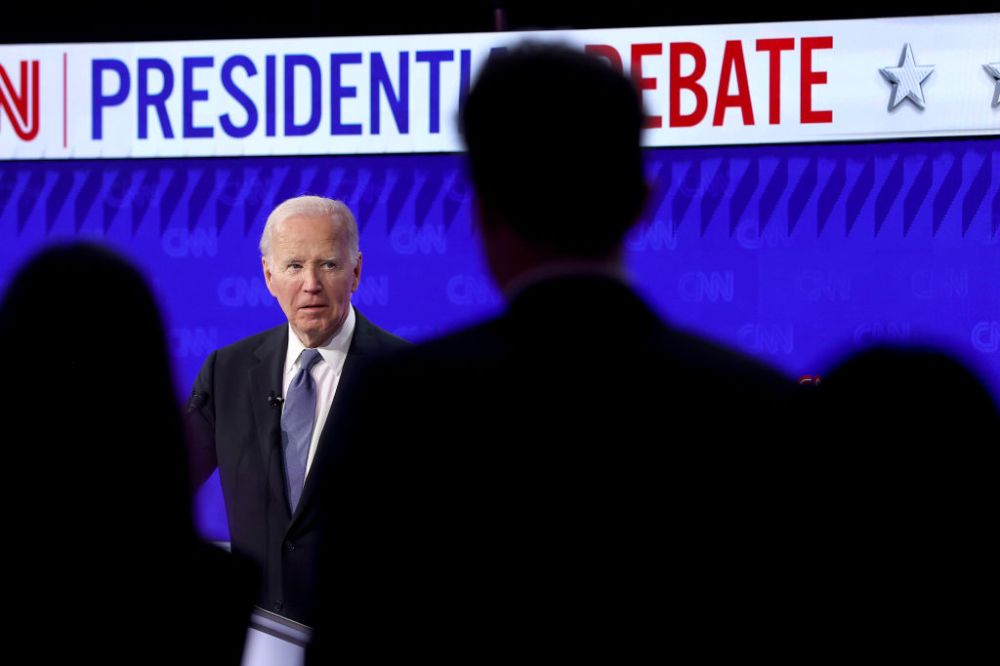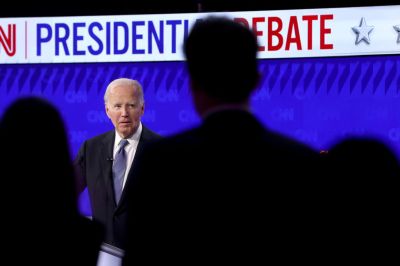Hello and happy Saturday. On Friday’s Dispatch Podcast, Sarah led off the conversation by saying “I felt like I was watching history” Thursday during the debate between President Joe Biden and Donald Trump in Atlanta.
So much for the adage that “debates don’t matter.” The president delivered a historically bad performance, delivering incoherent answers to more than one question. CNN’s heavy reliance on a split-screen with close-up shots of the candidates worked against him, as he often stared ahead vacantly while Trump spoke.
Back in February, Robert Hur, the special counsel tasked with investigating Biden’s retention of classified documents, released a report in which he recommended no criminal charges but described the president as “a sympathetic, well-meaning, elderly man with a poor memory”—citing it as a reason it would be hard to secure a conviction. Biden supporters cried foul, and the campaign has spent months pushing back on news articles reporting concerns about Biden’s age and fitness.
Those protests rang hollow as the debate played out Thursday night. As we noted in Friday’s Morning Dispatch: “Before the first commercial break, Democrats across the country had been sent into a blind panic about their party’s chances come November.”
It’s not hard to see why:
Biden tried to highlight his own policy wins, but he often failed to articulate his point, instead teeing up attacks from his opponent. When the president attempted to argue the revenue from his tax plans for higher earners would enable the government to expand social spending programs, he lost his train of thought and ran out of time: “We’d be able to help make sure that all those things we need to do—child care, elder care, making sure that we continue to strengthen our healthcare system, making sure that we’re able to make every single solitary person eligible for what I’ve been able to do with the—with with—with the COVID, excuse me, with dealing with everything we have to do with—look, if—we finally beat Medicare.”
Jonah isn’t exactly sympathetic to the panicked. In fact, he’s angry. The Democrats insist that Donald Trump is an existential threat to democracy. If they really believe that, why have they been pretending that everything is fine and dandy? He writes in the G-File: “The Biden campaign has been like the ugly American who thinks foreigners will understand English if he just speaks it louder. Again, I’m open to that argument. But the voters Biden needs to win just aren’t. So if they actually believed what they were saying, they would run a campaign—and a candidate—who is up to the job and can win.”
To its credit, as the Dispatch Politics team reports, the Biden campaign told its allies and supporters to be honest in their assessments of the president’s debate performance. Former Obama Cabinet member Julián Castro was unsparing, calling Biden “unprepared, lost, and not strong enough to parry effectively with Trump, who lies constantly.” Former Democratic Sen. Claire McCaskill delivered perhaps the most powerful statement of the night. She called what she needed to say “heartbreaking” but continued: “He had one thing he had to accomplish, and that was: reassure America that he was up to the job at his age. And he failed at that tonight.”
Nick declares Biden’s candidacy over: “Joe Biden may well have many years of life left in him but, one way or another, he will not be president next year,” he writes in Boiling Frogs. Like Jonah, he blames Democrats for propping up Biden despite the obvious signs of decline, at the risk of letting Trump win in November: “If Democratic denialism ushers in a menagerie of fascists who might have been stopped by any non-demented nominee, it’ll be the most egregious case of political malpractice in American history.”
The next week or two will be very interesting. Friday evening, the New York Times published a staff editorial calling for Biden to step aside as the 2024 presidential candidate. The Washington Post ran a piece naming 10 people who could replace him on the ticket. Just this morning, in Stirewalt on Politics, Chris explained how a Biden exit might play out. While the concern about Biden’s age and fitness wasn’t exactly in the background of the campaign, it was just one of several factors that made the race between Trump and Biden so undesirable: the old guy versus the coup-plotter, and all that. But now it is the issue, and having ignored it for so long, the Democrats are left with several unattractive options. It feels like we’re watching history.
Thanks for reading, and have a good weekend.
Ahead of the debate, Brian Riedl explained why Biden’s and Trump’s economic agendas are unserious and lacking. Inflation is stubborn, interest rates remain high, and the deficit is growing. Whoever takes office will have to contend with budget challenges with the expiration of tax cuts, discretionary spending caps, and the 2021 infrastructure bill. What is either candidate going to do about it? Well, ignore the biggest looming challenge—entitlement reform—for starters. Biden plans to raise taxes, though he had little luck doing so even when Democrats controlled Congress. Trump, meanwhile, has a plan to watch a “global trade war,” with a 10 percent global tariff and tariffs as high as 60 percent on Chinese goods. He writes: “Inflation would likely be driven upward by both candidates’ aggressively expansionary fiscal policies. This inflation would then be either modestly worsened by Biden’s regulatory policies, or dramatically worsened by Trump’s trade war. Such inflation and surging federal debt would also continue to hike interest rates, including mortgage rates.”
When Hamas invaded Israel on October 7, they didn’t attack just Jewish Israelis. The terrorists also killed dozens of Bedouins—Arab and Muslim Israelis who make up about 4 percent of Israel’s population. And the members of the “Bedouin Battalion,” a desert-tracking unit headquartered at the Kerem Shalom military base, are defending their country. Charlotte talked to one soldier who said, “I’m a Muslim myself and there’s no religion, including Islam, that says that it’s OK to kill. That’s what differentiates Hamas. Their purpose is to kill.” She also reports on the challenges facing the Bedouin community–high poverty, crime, lack of basic services and conflict with the Israeli government. Military service is voluntary for Bedouins, and Charlotte notes it was uncommon before the Hamas attack. Now Bedouins are proud to serve, and military service offers a chance for a better life and integration into Israeli society. “We’re here in Israel, and we know exactly who Hamas is and what we’re up against,” the soldier told Charlotte.
And here’s the best of the rest.
- Rarely, we get a slower news day, and The Morning Dispatch takes advantage. On Tuesday, the crew got to do a deep dive on lithium, the mineral that makes up the batteries that power not only all of our electronic gadgets but also electric vehicles and windmills. The U.S. has a healthy supply, but setting up the infrastructure to mine it has proved challenging.
- Cole Murphy talks to Georgia voters who are fed up with grocery prices and are blaming Joe Biden for persistent inflation. Biden won Georgia in 2020 but it’s very much up for grabs this time around.
- The debate was a disaster for Biden, but it was bad in the normal ways, too. For example, both candidates told a slew of falsehoods. Alex burned the midnight oil after the debate to collect and debunk the biggest false claims.
- The surgeon general wants to put warning labels on social media to protect kids, and Kevin is having flashbacks to the 1980s when Tipper Gore and the Parents Music Resource Center fought to slap warning labels on music with violent or raunchy lyrics. He doesn’t think warning labels are the answer, but he thinks he understands how such efforts come to be: “When the big things feel like they have spun into chaos, it is tempting to try to really clamp down on some of the little things.
- And the pods! Brother Stirewalt took over Remnant duties from Brother Jonah, and had a fascinating conversation with Benn Steil, director of international economics at the Council on Foreign Relations, about Henry Wallace, FDR’s vice president from 1941 to 1945. Was Wallace “a noble man of the soil, an unsophisticated victim, or vindictive villain”? Listen to find out. Normally the biggest news the last week of June comes from the Supreme Court, as the justices hand down the final decisions of the term. On Advisory Opinions, David and Sarah discuss the ruling in Loper Bright Enterprises v. Raimondo. In overturning the Chevron doctrine, the court has curbed the power of federal regulatory agencies. If you are still looking for more post-debate analysis, check out Dispatch Live.







Please note that we at The Dispatch hold ourselves, our work, and our commenters to a higher standard than other places on the internet. We welcome comments that foster genuine debate or discussion—including comments critical of us or our work—but responses that include ad hominem attacks on fellow Dispatch members or are intended to stoke fear and anger may be moderated.
With your membership, you only have the ability to comment on The Morning Dispatch articles. Consider upgrading to join the conversation everywhere.